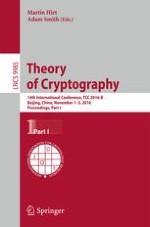2016 | OriginalPaper | Chapter
Fast Pseudorandom Functions Based on Expander Graphs
Authors : Benny Applebaum, Pavel Raykov
Published in: Theory of Cryptography
Publisher: Springer Berlin Heidelberg
Activate our intelligent search to find suitable subject content or patents.
Select sections of text to find matching patents with Artificial Intelligence. powered by
Select sections of text to find additional relevant content using AI-assisted search. powered by
